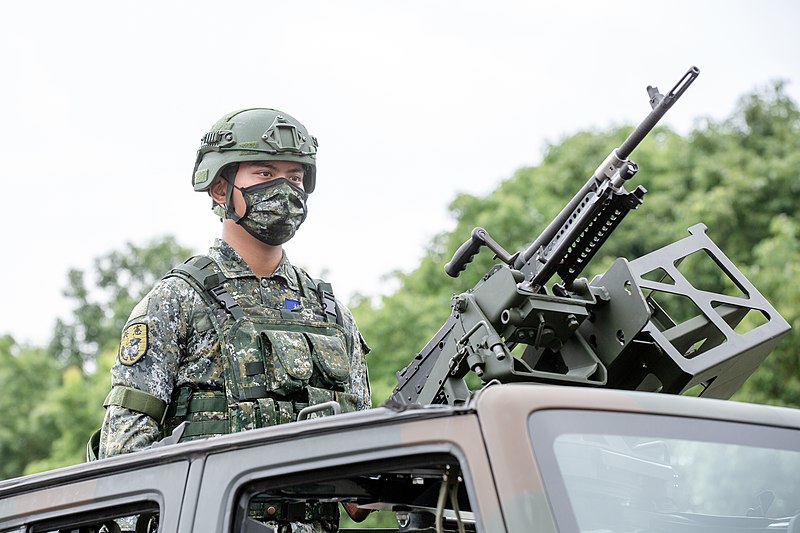Tensions between China and Taiwan remain at a high in the South China Sea, with a possibility of an all-out conflict. Taiwan’s military recently conducted drills targeting simulated Chinese warplanes.
The recent military exercises by Taiwanese forces were meant to highlight Taiwan’s military readiness ahead of the Lunar New Year holidays at the end of the month. This also comes as Chinese fighter jets have repeatedly made incursions over Taiwanese airspace. China’s People’s Liberation Army has also conducted military exercises near the Taiwan-controlled Pratas islands in the South China Sea.
“With the very high frequency of Communist planes entering our ADIZ, pilots from our wing are very experienced and have dealt with almost all types of their aircraft,” said Taiwan Major Hsiang-sheng.
China has claimed Taiwan as part of its territory and has been engaging in a pressure campaign on the democratically-ruled island nation. Taiwan has insisted on its autonomy and independence, angering Beijing. The island nation has also been a key ally to western countries in the region.
This has also prompted fears that Chinese President Xi Jinping may consider carrying out an invasion to reunify Taiwan with the mainland. The members of the “Quad” alliance of countries – the US, Australia, Japan, and India – are also facing pressure to counter China’s increasing aggression in the region, especially on Taiwan.
Aside from claiming Taiwan, China also claims sovereignty over the majority of the South China Sea, angering the surrounding countries that have their respective claims over the body of water.
During her new year’s remarks, Taiwanese leader Tsai Ing-wen warned China against attempting any “military adventurism.” Tsai said that military conflict is not the answer, citing that it would only cause economic instability in the region. Tsai said that the island nation’s stance has always been never to go give in to pressure and to maintain caution when receiving support.
“We must remind the Beijing authorities to not misjudge the situation and to prevent the internal expansion of military adventurism,” said the Taiwanese leader.
“The military is definitely not an option for solving cross-strait disagreements. Military conflicts would impact economic stability. Our two sides jointly shoulder the responsibility of maintaining regional peace and stability,” said Tsai.



 Russia Signals Openness to U.S. Security Guarantees for Ukraine at Geneva Peace Talks
Russia Signals Openness to U.S. Security Guarantees for Ukraine at Geneva Peace Talks  Middle East Conflict Escalates After Khamenei’s Death as U.S., Israel and Iran Exchange Strikes
Middle East Conflict Escalates After Khamenei’s Death as U.S., Israel and Iran Exchange Strikes  U.S. Deploys Tomahawks, B-2 Bombers, F-35 Jets and AI Tools in Operation Epic Fury Against Iran
U.S. Deploys Tomahawks, B-2 Bombers, F-35 Jets and AI Tools in Operation Epic Fury Against Iran  Israel Launches Fresh Strikes on Iran After Death of Supreme Leader Ayatollah Khamenei
Israel Launches Fresh Strikes on Iran After Death of Supreme Leader Ayatollah Khamenei  Trump Says U.S. Attacks on Iran Will Continue, Warns of More American Casualties
Trump Says U.S. Attacks on Iran Will Continue, Warns of More American Casualties  Israel Declares State of Emergency as Iran Launches Missile Attacks
Israel Declares State of Emergency as Iran Launches Missile Attacks  Australia Rules Out Military Involvement in Iran Conflict as Middle East Tensions Escalate
Australia Rules Out Military Involvement in Iran Conflict as Middle East Tensions Escalate  U.S.-Israel Strike on Iran Escalates Middle East Conflict, Trump Claims Khamenei Killed
U.S.-Israel Strike on Iran Escalates Middle East Conflict, Trump Claims Khamenei Killed  Macron Urges Emergency UN Security Council Meeting as US-Israel Strikes on Iran Escalate Middle East Tensions
Macron Urges Emergency UN Security Council Meeting as US-Israel Strikes on Iran Escalate Middle East Tensions  Argentina Tax Reform 2026: President Javier Milei Pushes Lower Taxes and Structural Changes
Argentina Tax Reform 2026: President Javier Milei Pushes Lower Taxes and Structural Changes  Netanyahu Suggests Iran’s Supreme Leader Khamenei May Have Been Killed in Israeli-U.S. Strikes
Netanyahu Suggests Iran’s Supreme Leader Khamenei May Have Been Killed in Israeli-U.S. Strikes  Marco Rubio to Brief Congress After U.S.-Israeli Strikes on Iran
Marco Rubio to Brief Congress After U.S.-Israeli Strikes on Iran  Pentagon Leaders Monitor U.S. Iran Operation from Mar-a-Lago
Pentagon Leaders Monitor U.S. Iran Operation from Mar-a-Lago  UK Accepts U.S. Request to Use British Bases for Defensive Strikes on Iranian Missiles
UK Accepts U.S. Request to Use British Bases for Defensive Strikes on Iranian Missiles  Trump Says U.S. Combat Operations in Iran Will Continue Until Objectives Are Met
Trump Says U.S. Combat Operations in Iran Will Continue Until Objectives Are Met  Why did Iran bomb Dubai? A Middle East expert explains the regional alliances at play
Why did Iran bomb Dubai? A Middle East expert explains the regional alliances at play  Trump to Address Nation as U.S. Launches Strikes in Iran, Axios Reports
Trump to Address Nation as U.S. Launches Strikes in Iran, Axios Reports 































